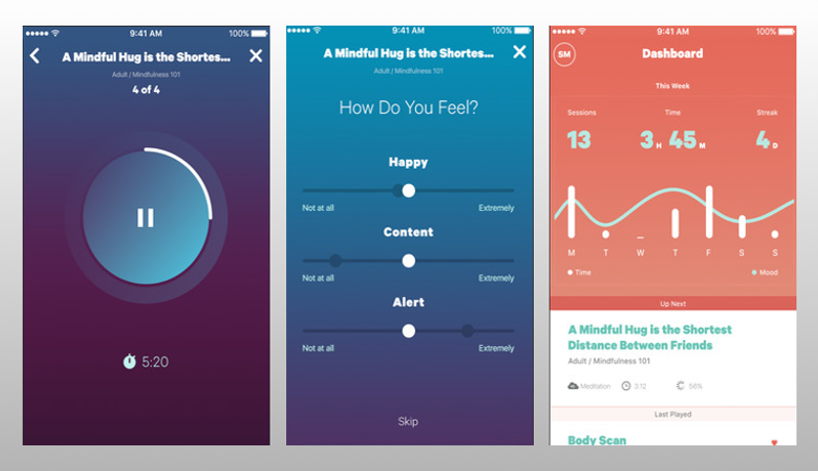It’s natural to experience heightened stress and anxiety during such challenging times. An increase in emotions such as worry, boredom, or low mood is normal. The virus has threatened the health of our community, disrupted our routines, and required us to carry out social distancing and self-isolation. It’s not an easy time.
How can you know whether you need to manage your stress or practice mindfulness? There are certain signals that tell us we’re getting close to breaking point. Every person will have different warning signs, but signals include irritability, losing patience, a sense of urgency, difficulty sleeping, thinking about worse-case scenarios, and eating or drinking more than usual.
Mindfulness can allow you to respond to these signals, preventing a negativity bias, while calming your nervous system and bringing clarity of thought and more positive emotions.
This resource aims to provide you with some basic tips on managing your stress and wellbeing during this challenging time.
Focus on the actions you can control
A key cause of stress is the constant news and overwhelming information about the outbreak. Instead of feeling powerless, try to learn how to protect yourself and others from the virus. The government has put measures in place to protect against infection and prevent the virus from spreading. These include good hygiene, self-isolation, and social distancing.
Be mindful of how long you spend on social media and reading news
Mindfulness is about purposefully paying attention to the present moment. This can be difficult in self-isolation when we’re not sure what to do with our time. Out of habit, we pick up our device and start scrolling, but with current events dominating news and social feeds, this flood of worrisome information and opinions can fuel our stress.
Instead, try to draw increased mindfulness to your time spent online. Ask yourself: is what you’re engaging with encouraging anxiety or calm?
If you’re in need of mentally unplugging and still find yourself seeking screen time, take a look at this list of comforting, feel-good Netflix shows to watch in in lockdown.
Try to stick to a routine
Forming positive habits can have a big impact on your mental state, especially while you’re spending so much time at home. Try not to miss the basics: healthy eating at mealtimes, proper sleep, physical exercise, and doing things you enjoy.
Exercising in the morning can make a difference to your mood for the rest of the day. Meal planning can give you the opportunity to try cooking healthy new recipes throughout the week. Going to bed at your usual time and setting your alarm will keep your circadian rhythm intact, even if you’re work schedule has changed.
Meditate
Meditation can help you stay psychologically and emotionally healthy while you’re spending extended periods of time at home. But it’s not easy to sit down, close your eyes, and clear your head—so consider using guided meditations to assist you.
Smiling Mind has developed a free mindfulness and meditation app designed to foster positive mental habits. It’s available for both iOS and Android and includes Family programs and Adult programs to suit various needs.
Take a look at the app page on the Smiling Mind website for more information and download links.
Self-enquire: what opportunities are open to you?
You might find yourself with additional quiet time while at home. This is a great time to do some things you’ve already wanted to do but haven’t had time. Home learning, creative endeavours, reading, gardening, cooking, do-it-yourself projects—turn this isolation period into a positive opportunity to explore.
Make time to be outside
There are many cognitive and physical health benefits of being outside, so try to get out of the house. Even sitting on your apartment balcony will get you sunlight and vitamin D, though a walk through a local park (while practicing safe social distancing) is even better.
Pay attention to your emotional hygiene
Watch this TED Talk by Guy Winch on emotional first aid.
Support services
If you’re struggling with stress and anxiety and would like additional support, please consider the following services:
Lifeline for crisis support.
Beyond Blue for online phone and mental health support.
Mindspot for free online and telephone support for people experiencing anxiety, worry, depression, or low mood.
Suicide Callback Service for 24/7 online and telephone counselling to people who are affected by suicide.
The Business Resilience program is designed to assist Victorian small businesses affected by COVID-19. Support includes free access to online workshops and resources.
Business Resilience Workshops
Eligible participants can attend free virtual workshops on topics pertinent to the impacts of COVID-19 on small business. This includes strategy and resilience, finance and technology, customers and marketing, human resources, and mental health and wellbeing. Visit our Business Resilience Workshops page for upcoming topics and booking links.
The Business Resilience program is delivered by Melbourne Innovation Centre and the Digital Solutions program.



